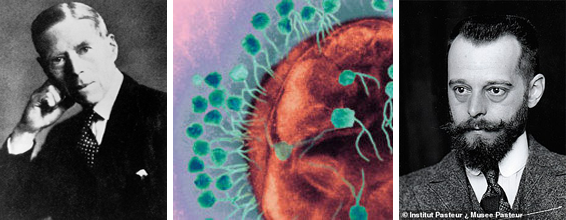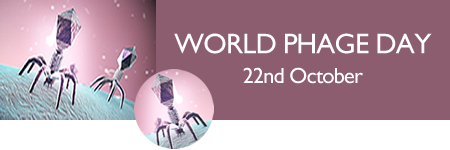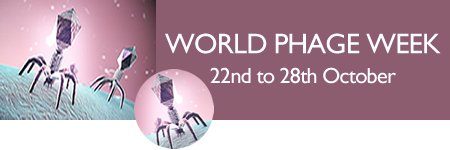World Phage Week aims to increase the global community’s awareness of the life-saving potential offered by 'phages', a naturally occurring, specific class of a bacteria-eating virus, which kill bacteria. Phages are the most numerous and diverse entities on the planet, harmless to humans, animals and the environment, but deadly to susceptible pathogenic bacteria. Discovered over 100 years ago, phage therapy was tried extensively in the West in the 1920s and 1930s. Despite the desperate clinical battle against infections in the pre-antibiotic era, phage therapy was largely undeveloped by the time penicillin was made widely available in the 1940s. The easy to use and highly effective broad spectrum penicillin antibiotic became known as the 'miracle drug' - saving millions of lives. Consequently interest in further development of the wide-ranging potential offered by bacteriophages waned and apart from Russia and a few other countries, phage therapy was largely neglected by Western scientists.
What Has Changed?
In 1928, Alexander Fleming discovered penicillin,but it took another two decades before penicillin became generally available. Fleming, in his Nobel Award speech, warned against overuse as pathogenic bacteria will naturally develop ways to survive and resist being attacked by new drugs. No-one listened! Antimicrobial resistance (AMR), has been accelerating over the past several decades due to profligate overuse and misuse of antibiotics. Bacterial pathogens are winning this natural evolutionary battle and are developing multi-drug resistance to all our known antibiotic, antifungal and antimalarial treatments. The global community is being pushed into a life-threatening post-antibiotic era and already people are dying because antibiotics are unable to stop the infections. The increasing global threat posed by antimicrobial resistance (AMR) is now propelling renewed global interest in bacteriophages, a natural killer of bacteria. Phage development may deliver some life saving options so desperately needed in this emerging battle against infections.
The Phage Pioneers - Twort-d’Herelle Phenomenon

(Frederick Twort and Felix d'Herelle)
Frederick Twort, a British microbiologist, the father of virology, who in 1915, published his pioneering work, ‘An Investigation on the Nature of Ultra-Microscopic Viruses’ in the Lancet. It was the first report of viruses injecting their own DNA or RNA into a susceptible bacteria, replicating within and killing the bacteria as multiple phages are explosively released.
Unfortunately, he was unable to continue with his ground-breaking research due to the outbreak of the First World War. His research funding was suspended and he was sent to serve abroad as an army medical officer.
Felix d’Herelle, a French Canadian microbiologist is credited with the discovery of the bacteriophage. Based at the Pasteur Institute, he was able to continue his research work during WWI, gathering evidence for successful application of bacteriophages. Publishing his work in 1917, he named the bacteria-eating virus ‘bacteriophage’ - now usually referred to as ‘phage’. The term bacteriophage is derived from "bacteria" and the Greek: (phagein), "to devour". The combined ground-breaking work of both phage pioneers was recognised as the ‘Twort-d’Herelle phenomenon’.
For a brief history of Bacteriophages visit http://www.intralytix.com/index.php?page=hist
Promoting Phage Development
World Phage Week is an opportunity to recall the important pioneering work of both Frederick Twort and Felix d’Herelle and to celebrate the collaborative work of everyone, past and present, involved in pioneering the development of phage therapy. To combat the threat to global health posed by the ever-increasing antimicrobial, fungal and antimalarial resistance requires a global coordinated response, new antibiotics and alternative therapeutics. The long overlooked potential offered by bacteriophage development is now being recognised and researched as one lifesaving option. World Phage Week provides an additional focus on the European Antibiotic Awareness Day, 18 November and World Antibiotic Awareness Week, 18-24 November,
Phage researchers and ‘Phage Phans’ around the world are encouraged to join with AGEofthePHAGE.com and promote awareness of the wide-ranging and life-saving potential offered by phage development.
Please promote #WorldPhageDay (22nd October) and #WorldPhageWeek (22nd to 28th October)
Do tweet our banners and create your own phage images for social media and organise special events.
Please send details of any phage-related promotional actions you organise or participate in to contact [at] AGEofthePHAGE.com



